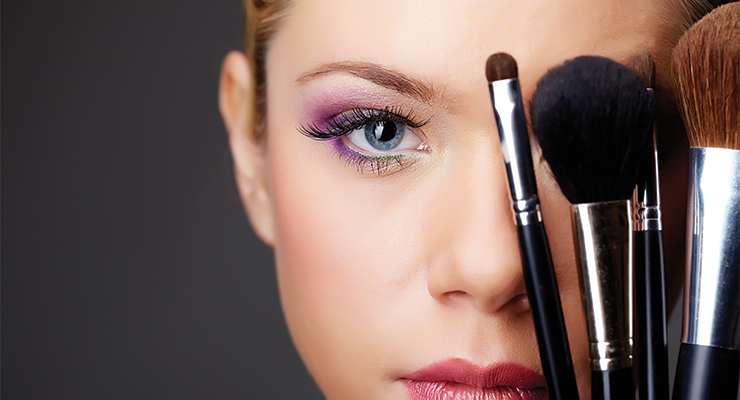Managing makeup on oily skin can be a challenge, but with the right techniques and products, you can achieve a flawless and long-lasting look. Oily skin tends to produce excess sebum, leading to makeup meltdown, shine, and clogged pores. In this article, we'll explore effective makeup hacks specifically tailored for oily skin types, ensuring a matte, shine-free complexion that lasts all day.
Understanding Oily Skin

Before diving into makeup hacks, it's essential to understand the characteristics of oily skin. Oily skin is characterized by excessive sebum production, resulting in enlarged pores, shine, and a tendency for makeup to slide off or oxidize quickly. Factors such as genetics, hormonal fluctuations, skincare products, and environmental influences can exacerbate oiliness.
Prepping Your Skin
Proper skincare forms the foundation for successful makeup application, especially for oily skin. Start by cleansing your face with a gentle, oil-free cleanser to remove excess oil, dirt, and impurities without stripping the skin's natural moisture. Follow up with a lightweight, oil-free moisturizer formulated for oily or combination skin to hydrate without adding additional shine.
Primer is Key
Invest in a mattifying primer specifically designed for oily skin to create a smooth, matte canvas for makeup application. Mattifying primers help control oil production, minimize the appearance of pores, and extend the wear time of your makeup. Focus on oily-prone areas such as the T-zone (forehead, nose, and chin) to ensure lasting shine control.
Choosing the Right Foundation
Opt for oil-free, matte foundations or powder foundations with oil-absorbing properties to combat shine and minimize the risk of clogged pores. Look for formulas labeled as "long-wear," "oil-control," or "matte finish" for maximum durability and shine resistance. Avoid heavy, emollient-based foundations that can exacerbate oiliness and contribute to makeup breakdown.
Setting Your Makeup

Setting your makeup with a translucent or mattifying setting powder is essential for locking in your look and controlling shine throughout the day. Use a fluffy powder brush to lightly dust the powder over your entire face, paying extra attention to oily-prone areas. This helps absorb excess oil and prevent makeup from sliding off or creasing, ensuring a matte, polished finish.
Blotting Papers to the Rescue
Keep oil-absorbing blotting papers or mattifying sheets on hand for quick touch-ups throughout the day. Gently press the blotting paper onto oily areas to absorb excess oil and refresh your makeup without disturbing its integrity. Avoid rubbing or dragging the blotting paper, as this can transfer bacteria and disrupt your makeup.
Matte, Oil-Free Formulas
When selecting makeup products such as blush, bronzer, and eyeshadow, opt for matte, oil-free formulas to minimize shine and maintain a natural-looking finish. Matte formulas help control oil production and prevent excessive shine, ensuring your makeup stays fresh and flawless all day long.
Avoid Overloading on Product

Less is more when it comes to makeup application for oily skin. Avoid overloading your skin with heavy layers of product, as this can exacerbate oiliness and lead to a cakey, unnatural appearance. Opt for lightweight, buildable formulas and apply them sparingly, focusing on areas that require coverage or correction.
Regular Touch-Ups
Throughout the day, periodically check your makeup for signs of shine or oil breakthrough, especially in hot or humid environments. Carry oil-control products such as blotting papers, mattifying powder, or oil-absorbing setting spray for on-the-go touch-ups to keep your makeup looking fresh and matte.
Conclusion
In conclusion, mastering makeup application for oily skin requires understanding your skin's unique needs and adopting tailored techniques and products to achieve a flawless, long-lasting look. By prepping your skin, using mattifying primers and foundations, setting your makeup, and incorporating oil-control products into your routine, you can effectively combat shine and maintain a matte, polished complexion throughout the day.
FAQs
Q. Can I skip moisturizer if I have oily skin?
Ans: No, moisturizer is essential for oily skin to maintain hydration and balance oil production. Opt for lightweight, oil-free moisturizers formulated for oily or combination skin.
Q. How often should I touch up my makeup during the day?
Ans: Touch-up frequency depends on individual skin type and environmental factors. Monitor your skin throughout the day and touch up as needed to control shine and maintain a matte finish.
Q. Is it necessary to use a mattifying primer if I already have matte foundation?
Ans: Using a mattifying primer helps control oil production, minimize the appearance of pores, and extend the wear time of your makeup, regardless of your foundation choice. It's recommended for oily skin types to enhance longevity and shine control.
Q. Can oily skin benefit from using facial oils?
Ans: While facial oils can provide hydration and nourishment, they may exacerbate oiliness for individuals with oily skin. It's best to use lightweight, non-comedogenic oils sparingly and incorporate them into your skincare routine as needed.
Q. How can I prevent my makeup from oxidizing on oily skin?
Ans: To prevent makeup oxidation on oily skin, ensure thorough cleansing and exfoliation to remove excess oil and impurities. Use oil-free, long-wear formulas and set your makeup with a mattifying setting powder to minimize oxidation and maintain color integrity.





